
By Michael Childress
Armed with scrub brushes, young scuba divers took to the waters of Florida’s Alligator Reef in late July to try to help corals struggling to survive 2023’s extraordinary marine heat wave. They carefully scraped away harmful algae and predators impinging on staghorn fragments, under the supervision and training of interns from Islamorada Conservation and Restoration Education, or I.CARE.
Normally, I.CARE’s volunteer divers would be transplanting corals to waters off the Florida Keys this time of year, as part of a national effort to restore the Florida Reef. But this year, everything is going in reverse.
As water temperatures spiked in the Florida Keys, scientists from universities, coral reef restoration groups and government agencies launched a heroic effort to save the corals. Divers have been in the water every day, collecting thousands of corals from ocean nurseries along the Florida Keys reef tract and moving them to cooler water and into giant tanks on land.
Marine scientist Ken Nedimyer and his team at Reef Renewal USA began moving an entire coral tree nursery from shallow waters off Tavernier to an area 60 feet deep and 2 degrees Fahrenheit (1.1 Celsius) cooler. Even there, temperatures were running about 85 to 86 F (30 C).
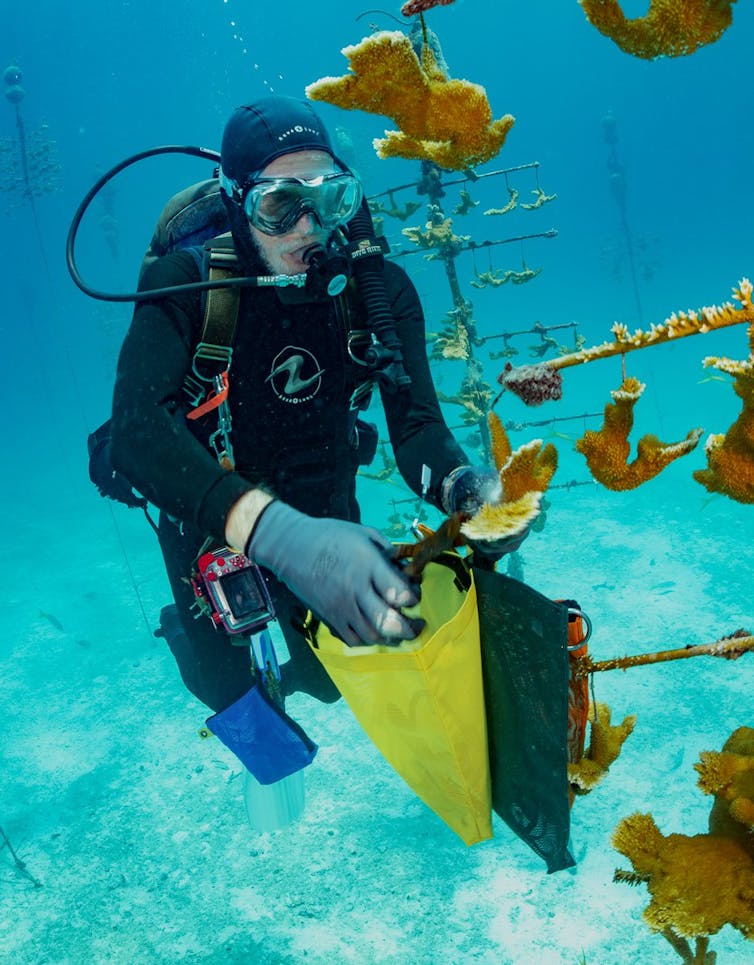
Reef Renewal USA
Their efforts are part of an emergency response on a scale never before seen in Florida.
The Florida Reef – a nearly 350-mile arc along the Florida Keys that is crucial to fish habitat, coastal storm protection and the local economy – began experiencing record-hot ocean temperatures in June 2023, weeks earlier than expected. The continuing heat has triggered widespread coral bleaching.
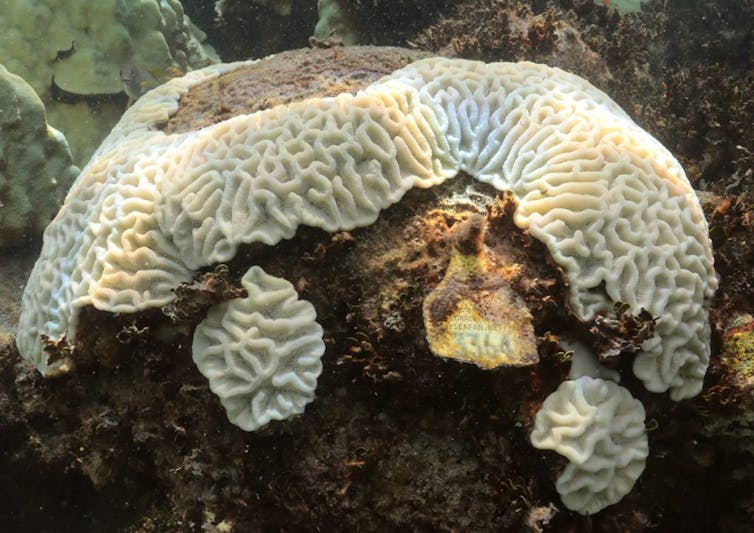
NOAA AOML
While corals can recover from mass bleaching events like this, long periods of high heat can leave them weak and vulnerable to disease that can ultimately kill them.
That’s what scientists and volunteers have been scrambling to avoid.
The heartbeat of the reef
The Florida Reef has struggled for years under the pressure of overfishing, disease, storms and global warming that have decimated its live corals.
A massive coral restoration effort – the National Oceanic and Atmospheric Administration’s Mission: Iconic Reef – has been underway since 2019 to restore the reef with transplanted corals, particularly those most resilient to the rising temperatures. But even the hardiest coral transplants are now at risk.
Reef-building corals are the foundation species of shallow tropical waters due to their unique symbiotic relationship with microscopic algae in their tissues.
During the day, these algae photosynthesize, producing both food and oxygen for the coral animal. At night, coral polyps feed on plankton, providing nutrients for their algae. The result of this symbiotic relationship is the coral’s ability to build a calcium carbonate skeleton and reefs that support nearly 25% of all marine life.
Unfortunately, corals are very temperature sensitive, and the extreme ocean heat off South Florida, with some reef areas reaching temperatures in the 90s, has put them under extraordinary stress.
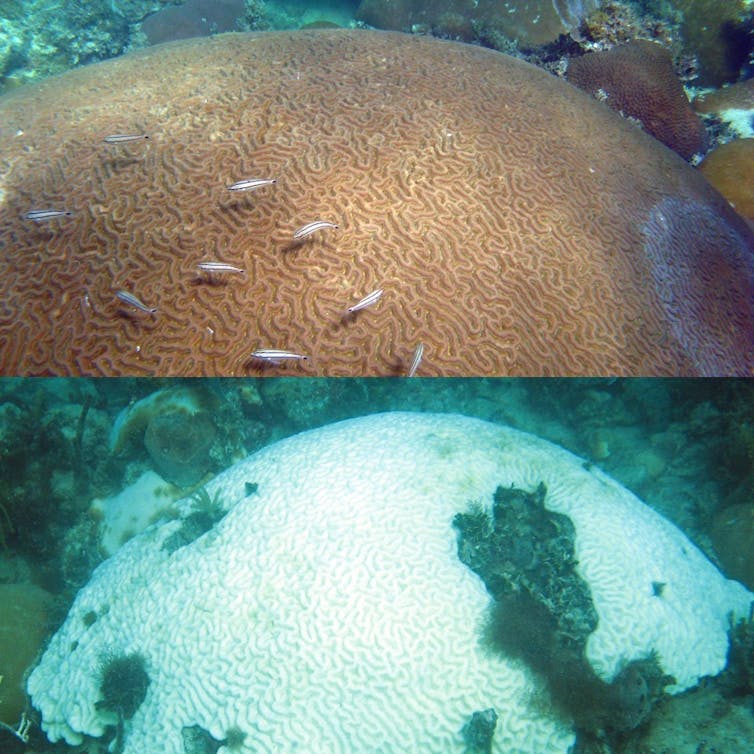
Photos by Michael Childress and Kylie Smith
When corals get too hot, they expel their symbiotic algae. The corals appear white – bleached – because their carbonate skeleton shows through their clear tissue that lack any colorful algal cells.
Corals can recover new algal symbionts if water conditions return to normal within a few weeks. However, the increase in global temperatures due to the effects of greenhouse gas emissions from human activities is causing longer and more frequent periods of coral bleaching worldwide, leading to concerns for the future of coral reefs.
A MASH unit for corals
This year, the Florida Keys reached an alert level 2, indicating extreme risk of bleaching, about six weeks earlier than normal.
The early warnings and forecasts from NOAA’s Coral Reef Watch Network gave scientists time to begin preparing labs and equipment, track the locations and intensity of the growing marine heat and, importantly, recruit volunteers.
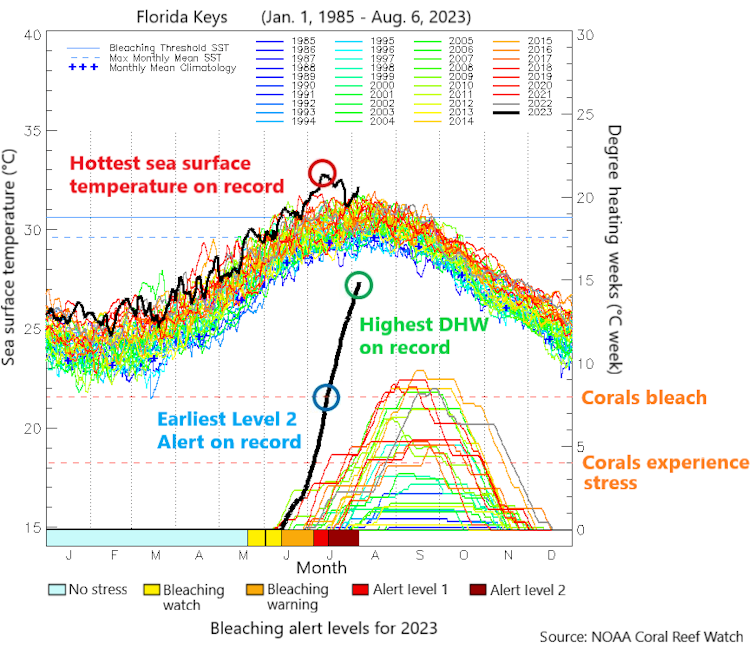
Adapted from NOAA
At the Keys Marine Laboratory, scientists and trained volunteers have dropped off thousands of coral fragments collected from heat-threatened offshore nurseries. Director Cindy Lewis described the lab’s giant tanks as looking like “a MASH unit for corals.”
Volunteers there and at other labs across Florida will hand-feed the tiny creatures to keep them alive until the Florida waters cool again and they can be returned to the ocean and eventually transplanted onto the reef.
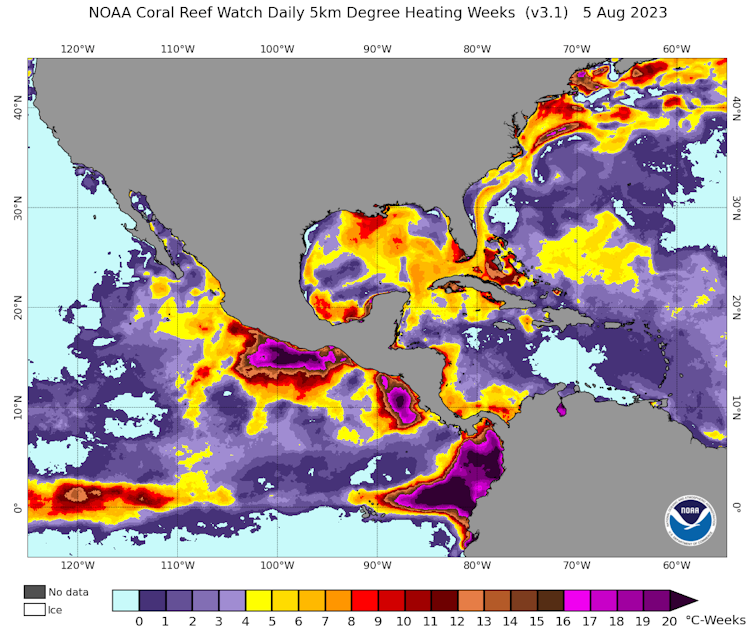
NOAA Coral Reef Watch
Protecting corals still in the ocean
I.CARE launched another type of emergency response.
I.CARE co-founder Kylie Smith, a coral reef ecologist and a former student of mine in marine sciences, discovered a few years ago that coral transplants with large amounts of fleshy algae around them were more likely to bleach during times of elevated temperature. Removing that algae may give corals a better chance of survival.
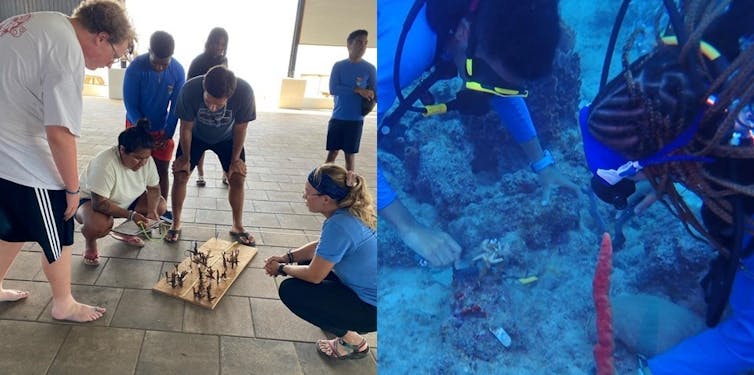
I.CARE
Smith’s group typically works with local dive operators to train recreational divers to assist in transplanting and maintaining coral fragments in an effort to restore the reefs of Islamorada. In summer 2023, I.CARE has been training volunteers, like the young divers from Diving with a Purpose, to remove algae and coral predators, such as coral-eating snails and fireworms, to help boost the corals’ chances of survival.
Monitoring for corals at risk
To help spot corals in trouble, volunteer divers are also being trained as reef observers through Mote Marine Lab’s BleachWatch program.
Scuba divers have long been attracted to the reefs of the Florida Keys for their beauty and accessibility. The lab is training them to recognize bleached, diseased and dead corals of different species and then use an online portal to submit bleach reports across the entire Florida Reef.
The more eyes on the reef, the more accurate the maps showing the areas of greatest bleaching concern.
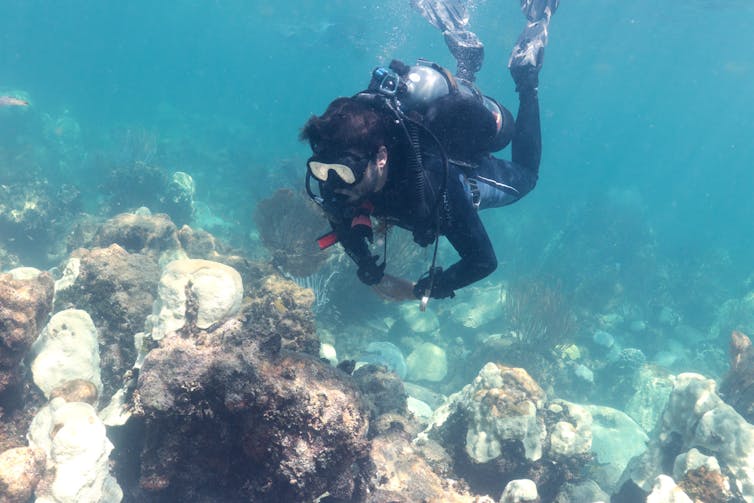
NOAA AOML
Rebuilding the reef
While the marine heat wave in the Keys will inevitably kill some corals, many more will survive.
Through careful analysis of the species, genotypes and reef locations experiencing bleaching, scientists and practitioners are learn valuable information as they work to protect and rebuild a more resilient coral reef for the future.
That is what gives hope to Smith, Lewis, Nedimyer and hundreds of others who believe this coral reef is worth saving. Volunteers are crucial to the effort, whether they’re helping with coral reef maintenance, reporting bleaching or raising the awareness of what is at stake if humanity fails to stop warming the planet.
![]()
Michael Childress is Associate Professor of Biological Sciences and Environmental Conservation at Clemson University.






























pete says
Can:t leave anything alone
Supraja Lakshmi N says
I learned a lot about the challenges and solutions for coral restoration in Florida. It is amazing to see how young scuba divers are helping to clean and transplant corals, and how scientists are moving them to cooler waters or tanks on land. Corals are essential for the marine ecosystem and the economy, and we need to act fast to save them from the heat stress. This article gives me hope that there is still a chance to save the Florida Reef.
Jane Gentile-Youd says
Thank you for enlightening and educating me of the obligation our society has to protect Coral an the reefs they form to protect us with . We need to remind ourselves that these coral are vital and beautiful living creations of God the same as we are, and I thank those people who are working hard to save them and …us…
James says
Some all new Floriduh vanity plates…
Save duh coral reefs!
Save duh manatees!
Save duh sea turtles!
Save duh gopher tortoises!
Save duh gators!
Save duh panthers!
Save duh golfers!
Save duh orange groves!
Save duh oaks!
Save duh canal homes!
…
Save Floriduh!
Laurel says
James: F-L-O-R-I-D-A and T-H-E.
Don’t you miss home…it misses you.
Now, back to reality. Scientists have been growing baby corals in the waters for some time now. They are also testing species that adapt better to warmer waters, but when water temps reach 100 and above, I don’t know it that can be dealt with the way we hope.
We are reaping what we sow.
DontsayRon says
Thoughts and prayers for the marine ecosystem.